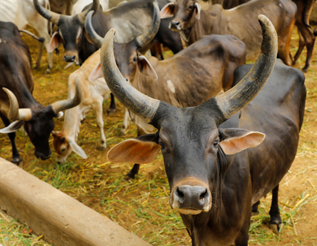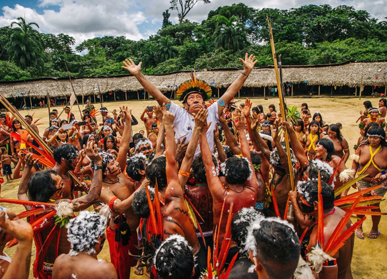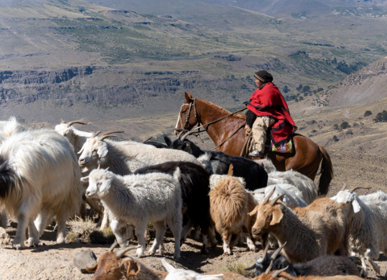Bài học cùng chủ đề
Báo cáo học liệu
Mua học liệu
Mua học liệu:
-
Số dư ví của bạn: 0 coin - 0 Xu
-
Nếu mua học liệu này bạn sẽ bị trừ: 2 coin\Xu
Để nhận Coin\Xu, bạn có thể:

Practice SVIP
Match.


Look, read and choose.

A group of people, often of related families, who live together, sharing the same language, culture, and history, especially those who do not live in towns or cities, is called __________.
Read and choose the correct answer.

A nomad is a member of a group of people who move from one place to another rather than living in one place all of the time. Which of the following is the Vietnamese equivalent for “nomad”?
On the Gobi Highlands, there are several tribes living and raising cattle. The tribes do not live a normal life like many of us. They live a nomadic life! This means they move two or three times a year in search of new pastures for their cattle. The cattle provide most of their needs: dairy products, meat, and clothing.
Nomadic tribes live in a ger. A ger is a traditional round tent that can be put up and transported easily. The ger keeps nomadic people cool in summer and warm in winter.
Nomadic life thrives in summer and survives in winter. When it is warm, they work hard on their farms. Once winter comes, temperatures drop extremely low and they stay indoors and survive on horse meat.
For most of the year, the tribes are surrounded by vast pastures, rivers and mountains. They see few people from the outside world. Any nomadic child can ride a horse. They learn from an early age to help in the family, from household chores to heavier work like herding the cattle. They also learn to be brave!
Read the passage and choose the correct answer.
Which of the following can be the best title of the text?
On the Gobi Highlands, there are several tribes living and raising cattle. The tribes do not live a normal life like many of us. They live a nomadic life! This means they move two or three times a year in search of new pastures for their cattle. The cattle provide most of their needs: dairy products, meat, and clothing.
Nomadic tribes live in a ger. A ger is a traditional round tent that can be put up and transported easily. The ger keeps nomadic people cool in summer and warm in winter.
Nomadic life thrives in summer and survives in winter. When it is warm, they work hard on their farms. Once winter comes, temperatures drop extremely low and they stay indoors and survive on horse meat.
For most of the year, the tribes are surrounded by vast pastures, rivers and mountains. They see few people from the outside world. Any nomadic child can ride a horse. They learn from an early age to help in the family, from household chores to heavier work like herding the cattle. They also learn to be brave!
Read the passage and choose the correct answer.
The tribes often move from place to place in order to __________.
On the Gobi Highlands, there are several tribes living and raising cattle. The tribes do not live a normal life like many of us. They live a nomadic life! This means they move two or three times a year in search of new pastures for their cattle. The cattle provide most of their needs: dairy products, meat, and clothing.
Nomadic tribes live in a ger. A ger is a traditional round tent that can be put up and transported easily. The ger keeps nomadic people cool in summer and warm in winter.
Nomadic life thrives in summer and survives in winter. When it is warm, they work hard on their farms. Once winter comes, temperatures drop extremely low and they stay indoors and survive on horse meat.
For most of the year, the tribes are surrounded by vast pastures, rivers and mountains. They see few people from the outside world. Any nomadic child can ride a horse. They learn from an early age to help in the family, from household chores to heavier work like herding the cattle. They also learn to be brave!
Read the passage and choose the correct answer.
Which of the following is true about the ger?
On the Gobi Highlands, there are several tribes living and raising cattle. The tribes do not live a normal life like many of us. They live a nomadic life! This means they move two or three times a year in search of new pastures for their cattle. The cattle provide most of their needs: dairy products, meat, and clothing.
Nomadic tribes live in a ger. A ger is a traditional round tent that can be put up and transported easily. The ger keeps nomadic people cool in summer and warm in winter.
Nomadic life thrives in summer and survives in winter. When it is warm, they work hard on their farms. Once winter comes, temperatures drop extremely low and they stay indoors and survive on horse meat.
For most of the year, the tribes are surrounded by vast pastures, rivers and mountains. They see few people from the outside world. Any nomadic child can ride a horse. They learn from an early age to help in the family, from household chores to heavier work like herding the cattle. They also learn to be brave!
Read the passage and choose the correct answer.
What does the word “thrive” in paragraph 3 most closely mean?
On the Gobi Highlands, there are several tribes living and raising cattle. The tribes do not live a normal life like many of us. They live a nomadic life! This means they move two or three times a year in search of new pastures for their cattle. The cattle provide most of their needs: dairy products, meat, and clothing.
Nomadic tribes live in a ger. A ger is a traditional round tent that can be put up and transported easily. The ger keeps nomadic people cool in summer and warm in winter.
Nomadic life thrives in summer and survives in winter. When it is warm, they work hard on their farms. Once winter comes, temperatures drop extremely low and they stay indoors and survive on horse meat.
For most of the year, the tribes are surrounded by vast pastures, rivers and mountains. They see few people from the outside world. Any nomadic child can ride a horse. They learn from an early age to help in the family, from household chores to heavier work like herding the cattle. They also learn to be brave!
Read the passage and choose the correct answer.
What do nomadic people do when it is very cold?
On the Gobi Highlands, there are several tribes living and raising cattle. The tribes do not live a normal life like many of us. They live a nomadic life! This means they move two or three times a year in search of new pastures for their cattle. The cattle provide most of their needs: dairy products, meat, and clothing.
Nomadic tribes live in a ger. A ger is a traditional round tent that can be put up and transported easily. The ger keeps nomadic people cool in summer and warm in winter.
Nomadic life thrives in summer and survives in winter. When it is warm, they work hard on their farms. Once winter comes, temperatures drop extremely low and they stay indoors and survive on horse meat.
For most of the year, the tribes are surrounded by vast pastures, rivers and mountains. They see few people from the outside world. Any nomadic child can ride a horse. They learn from an early age to help in the family, from household chores to heavier work like herding the cattle. They also learn to be brave!
Read the passage and choose the correct answer.
Nomadic children __________.
Life in the countryside sounds appealing as the country is more peaceful and pleasant to live in. However, moving to the countryside can be very difficult for teenagers when their friends all live in the city. 13-year-old Fiona Timson says 'Everyone else in my class seems to have such interesting weekends. They meet each other and do something cool together. That never happens to me.'
Fiona's mum, Helen, realises it's a problem. 'We moved here because it was quiet. But we possibly made the wrong choice. Fiona hardly ever leaves home, not because she's scared, but because there is simply nowhere for her to go. I can't drive her around because we only have one car, and my husband uses it for work.' Fiona can't spend the evening with friends because the last bus to the city is at five o'clock in the afternoon.
The Country Kids organisation aims to help children like Fiona. They give families money for four taxi rides per month. This allows children like Fiona to attend an after-school club once per week or visit friends on Sundays. Country Kids also organises trips to theatres and sports events in nearby cities at weekends. A minibus comes directly to the house and picks the kids up.
Read the passage and choose the correct answer.
What does the word “appealing” in paragraph 1 most closely mean?
Life in the countryside sounds appealing as the country is more peaceful and pleasant to live in. However, moving to the countryside can be very difficult for teenagers when their friends all live in the city. 13-year-old Fiona Timson says 'Everyone else in my class seems to have such interesting weekends. They meet each other and do something cool together. That never happens to me.'
Fiona's mum, Helen, realises it's a problem. 'We moved here because it was quiet. But we possibly made the wrong choice. Fiona hardly ever leaves home, not because she's scared, but because there is simply nowhere for her to go. I can't drive her around because we only have one car, and my husband uses it for work.' Fiona can't spend the evening with friends because the last bus to the city is at five o'clock in the afternoon.
The Country Kids organisation aims to help children like Fiona. They give families money for four taxi rides per month. This allows children like Fiona to attend an after-school club once per week or visit friends on Sundays. Country Kids also organises trips to theatres and sports events in nearby cities at weekends. A minibus comes directly to the house and picks the kids up.
Read the passage and decide if the sentences are true (T) or false (F).
|
Fiona often meets her friends at weekends. |
|
|
Fiona's mum thinks they are right to move their house. |
|
Life in the countryside sounds appealing as the country is more peaceful and pleasant to live in. However, moving to the countryside can be very difficult for teenagers when their friends all live in the city. 13-year-old Fiona Timson says 'Everyone else in my class seems to have such interesting weekends. They meet each other and do something cool together. That never happens to me.'
Fiona's mum, Helen, realises it's a problem. 'We moved here because it was quiet. But we possibly made the wrong choice. Fiona hardly ever leaves home, not because she's scared, but because there is simply nowhere for her to go. I can't drive her around because we only have one car, and my husband uses it for work.' Fiona can't spend the evening with friends because the last bus to the city is at five o'clock in the afternoon.
The Country Kids organisation aims to help children like Fiona. They give families money for four taxi rides per month. This allows children like Fiona to attend an after-school club once per week or visit friends on Sundays. Country Kids also organises trips to theatres and sports events in nearby cities at weekends. A minibus comes directly to the house and picks the kids up.
Read the passage and decide if the sentences are true (T) or false (F).
|
Fiona is scared of going out in the evening. |
|
|
There is no bus to the city in the evening. |
|
Life in the countryside sounds appealing as the country is more peaceful and pleasant to live in. However, moving to the countryside can be very difficult for teenagers when their friends all live in the city. 13-year-old Fiona Timson says 'Everyone else in my class seems to have such interesting weekends. They meet each other and do something cool together. That never happens to me.'
Fiona's mum, Helen, realises it's a problem. 'We moved here because it was quiet. But we possibly made the wrong choice. Fiona hardly ever leaves home, not because she's scared, but because there is simply nowhere for her to go. I can't drive her around because we only have one car, and my husband uses it for work.' Fiona can't spend the evening with friends because the last bus to the city is at five o'clock in the afternoon.
The Country Kids organisation aims to help children like Fiona. They give families money for four taxi rides per month. This allows children like Fiona to attend an after-school club once per week or visit friends on Sundays. Country Kids also organises trips to theatres and sports events in nearby cities at weekends. A minibus comes directly to the house and picks the kids up.
Read the passage and decide if the sentences are true (T) or false (F).
|
The Country Kids helps children attend after-school activities. |
|
|
The Country Kids takes children to see plays in nearby cities. |
|
Choose the correct answer to complete the exchange.
A: Why do you like living in the countryside?
B: __________
Choose the correct answer to complete the exchange.
A: What did you do in the village?
B: __________
Choose the correct answer to complete the exchange.
A: I had a wonderful holiday in the countryside.
B: __________
Two friends are talking about living in the countryside. Choose sentences a – e to complete the conversation.
|
a. But the countryside is closer to nature. b. For one, it's so peaceful and quiet. c. Actually, it is more affordable than living in the city. d. That's definitely something to consider. e. It's great for outdoor activities like hiking and fishing. |
A: Hey, have you ever thought about moving to the countryside?
B: No, I haven't. Why do you ask?
A: Well, I've been thinking about it lately and there are so many benefits to living in the countryside. You don't have to deal with all the noise and traffic of the city.
B: That does sound nice. What else?
A: The air is so much cleaner too. Plus, there's so much beautiful scenery out there.
B: I never thought about that. What about the cost of living?
A: Property prices are often lower in the countryside.
B: Thanks for bringing it up!
(Kéo thả hoặc click vào để điền)
Put the words in the correct order.
Put the words in the correct order.
Put the words in the correct order.

Bạn có thể đăng câu hỏi về bài học này ở đây
